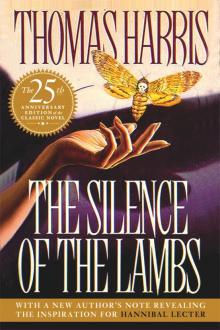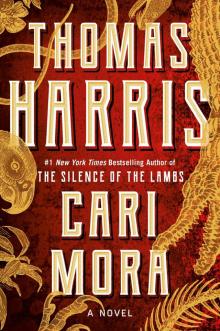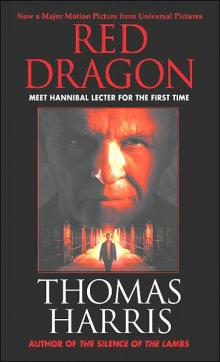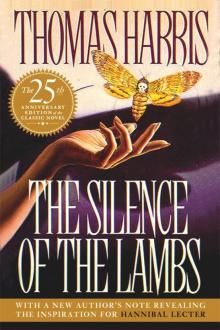- Home
- Thomas Harris
Black Sunday Page 15
Black Sunday Read online
Page 15
She put the crisp nurse’s cap on her head and secured it carefully with hairpins. She gave her appearance a final check in the mirror. The loose-fitting nurse’s uniform did her figure no justice, but it concealed the flat Beretta automatic stuffed into the top of her panty hose. She was satisfied.
The ground-floor hall containing the administrative offices was dim and deserted, lighting cut to a minimum in the energy shortage. She ticked off the signs as she passed along the hall. Accounting, Records, there it was—Patient Information. The inquiry window with its round conversation hole was dark.
A simple snap lock secured the door. Thirty seconds’ work with the tongue depressor forced back the beveled bolt and the door swung open. She had given considerable thought to her next move, and though it went against her instinctive wish to be hidden, she turned on the office lights instead of using the flashlight. One by one the banks of fluorescent lights buzzed and lit up.
She went to the large ledger on the inquiry desk and flipped it open. K. No Kabakov. Now she would have to go from door to door checking the nurses’ stations, watching out for guards, risking exposure. Wait. The television news had pronounced it Kabov. The papers had spelled it Kabov. Bottom of the page, here it was. Kabov, D. No address. All inquiries to be directed to the hospital administrator. Inquiries in person reported to administrator, hospital security, and the Federal Bureau of Investigation, LE 5-7700. He was in Room 327.
Dahlia took a deep breath and closed the book.
“How did you get in there?”
Dahlia in a double reflex nearly jumped, did not jump, looked up calmly at the security guard peering at her through the inquiry window. “Hey, you want to make yourself useful,” she said, “you could take this book up to the night administrator and I won’t have to go all the way back upstairs. It weighs ten pounds.”
“How did you get in there?”
“The night administrator’s key.” If he asked to see the key, she would kill him.
“Nobody is supposed to be in here at night.”
“Look, you want to call upstairs and tell them they have to have your permission, that’s fine with me. I was just told to come bring it, that’s all.” If he tried to call, she would kill him. “What, should I check in with you if they send me down here? I would have done that, but I didn’t know.”
“I’m responsible for this, see. I have to know who is here. I see this light, I don’t know who’s here. I have to leave the door to find out. What if somebody is waiting at the front to come in? Then they’re mad at me, see, because I’m not at the door. You check with me when you come down here, all right?”
“All right, sure. I’m sorry.”
“Be sure you lock this up and turn out the light, all right?”
“Sure.”
He nodded and walked slowly down the hall.
Room 327 was quiet and dark. Only the streetlights below shone through the venetian blinds, casting faint bars of light on the ceiling. Eyes accustomed to the dark could make out the bed, fitted with its aluminum frame to hold the covers up off the patient. In the bed, Dotty Hirschburg slept the deep sleep of childhood, the tip of her thumb just touching the roof of her mouth, fingers spread on the pillow. She had watched the playground from the window of her new room all afternoon, and she had tired herself out. She was accustomed by now to the comings and goings of the night nurses and she did not stir when the door slowly opened. A column of light widened on the opposite wall, was blotted by a shadow, and then narrowed again as the door quietly closed.
Dahlia Iyad stood with her back against the door, waiting for her pupils to dilate. The light from the hall had shown her that the room was empty except for the patient, the cushions of the chair still deeply dented from Moshevsky’s vigil. Dahlia opened her mouth and throat to silence her breathing. She could hear other breathing in the darkness. Nurse’s footsteps in the hall behind her, pausing, entering the room across the hall.
Dahlia moved silently to the foot of the tentlike bed. She set her tray down on the rolling bed table and took the hypodermic from her pocket. She removed the cap from the long needle and depressed the plunger until she could feel a tiny bead of the fluid at the tip of the needle.
Anywhere would do. The carotid then. Very quick. She moved up beside the bed in the dark and felt gently for the neck, touched hair and then the skin. It felt soft. Where was the pulse? There. Too soft. She felt with thumb and fingers around the neck. Too small. The hair too soft, the skin too soft, the neck too small. She put the hypo in her pocket and switched on her penlight.
“Hello,” said Dotty Hirschburg, blinking against the light. Dahlia’s fingers rested cool on her throat.
“Hello,” Dahlia said.
“The light hurts my eyes. Do I have to have a shot?” She looked up anxiously at Dahlia’s face, lighted from beneath. The hand moved to her cheek.
“No. No, you don’t have to have a shot. Are you all right? Do you want anything?”
“Do you go around and see if everybody is asleep?”
“Yes.”
“Why do you wake them up then?”
“To make sure they’re all right. You go back to sleep now.”
“It seems pretty silly to me. Waking people up to see if they’re asleep.”
“When did you move in here?”
“Today. Mr. Kabakov had this room. My mother asked for it so I can see the playground.”
“Where is Mr. Kabakov?”
“He went away.”
“Was he very sick, did they take him away covered up?”
“You mean dead? Heck no, but they shaved a place on his head. We watched the ballgame together yesterday. The lady doctor took him away. Maybe he went home.”
Dahlia hesitated in the hall. She knew she should not push it now. She should leave the hospital. She should fail. She pushed it. At the icemaker behind the nurses’ station, she spent several minutes packing a pitcher with cubes. The head nurse, all starch and spectacles and iron gray hair, was talking with a nurse’s aide in one of those listless conversations that drift on through the night with no beginning or end. At last the head nurse rose and marched down the hall in response to a call from a floor nurse.
Dahlia was at her desk in a second, flipping through the alphabetical index. No Kabakov. No Kabov. The nurse’s aide watched her. Dahlia turned to the woman.
“What happened to the patient in 327?”
“Who?”
“The man in 327.”
“I can’t keep up with them. I haven’t seen you before, have I?”
“No, I’ve been at St. Vincent’s.” This was true—she had stolen her credentials at St. Vincent’s Hospital in Manhattan during the afternoon shift change. Dahlia had to hurry this up, even if she aroused the woman’s suspicions. “If he was moved, there would be a record, right?”
“It would be downstairs locked up. If he’s not in the file, he’s not on this floor, and if he’s not on this floor he’s most likely not in this hospital.”
“The girls were saying there was such a flap when he came in.”
“There’s a flap all the time, honey. Woman doctor come in here yesterday morning about three a.m., wanting to see his X-rays. Had to go upstairs and open up radiology. They must have moved him in the daytime after I left.”
“Who was the doctor?”
“I don’t know. Nothing would do but she was going to have those X-rays.”
“Did she sign for them?”
“Up in radiology she had to sign them out, just like everybody signs them out.”
The head nurse was coming. Quickly now. “Is radiology on four?”
“Five.”
The head nurse and the aide were talking as Dahlia entered the elevator. The doors closed. She did not see the aide nod toward the elevator, did not see the head nurse’s expression change as she remembered instructions from the night before, did not see her reach for the telephone fast.
In the emergency room Policeman John S
ullivan’s belt beeper sounded. “Now shut your mouth!” he said to the cursing, bloody drunk his partner was holding. Sullivan undipped his walkie-talkie and responded to the call.
“Complainant third-floor head nurse Emma Ryan reports a suspicious person, white female, blond, about five-seven, late twenties, nurse’s uniform, possibly in radiology on the fifth floor,” the precinct dispatcher told Sullivan. “Security guard will meet you at the elevators. Unit seven-one is on the way”
“Ten-four,” Sullivan said, switching off. “Jack, cuff this bastard to the bench and cover the stairs until seven-one gets here. I’m going up.”
The security guard was waiting with a bunch of keys.
“Freeze all the elevators except the first one,” Sullivan said. “Let’s go.”
Dahlia had no trouble with the lock on the radiology lab. She closed the door behind her. In a moment she made out the bulk of the X-ray table, the vertical slab of the fluoroscope. She rolled one of the heavy leaded screens in front of the frosted glass door and turned on her penlight. The small beam played over the coiled barium hose, the goggles and gloves hanging beside the fluoroscope. Faintly a siren. An ambulance? Police? Looking around quickly. This door—a darkroom. An alcove lined with big filing cabinets. Drawer opening on loud rollers—X-rays in envelopes. Here a small office, a desk, and a book. Footsteps in the hall. A circle of light on the pages. Flip, flip. Yesterday’s date. A page of signatures and case numbers. It had to be a woman’s name. Go by the time in the left column—four a.m., case number, no patient’s name, X-ray signed out to Dr. Rachel Bauman. Not signed back in.
The footsteps stopping at the door. A tinkle of keys. The first one didn’t work. Throw the wig behind the cabinet, glasses with it. Door bumping against the leaded screen. A bulky policeman and a security guard coming in.
Dahlia Iyad was standing before an illuminated X-ray viewer. A chest X-ray was clamped over the lighted screen of the viewer, ribs projecting bars of light and shadow on her uniform. The shadows of the bones moved over her face as she turned her head toward the men. The policeman’s gun was out.
“Yes, Officer?” Pretending to notice the gun for the first time. “My goodness, is something wrong?”
“Stand right there, ma‘am.” With his free hand, Sullivan fumbled for the light switch and found it. The room lit up, Dahlia seeing details of the office she had not noticed in the darkness. The policeman looked over the room with quick snaps of his head.
“What are you doing in here?”
“Examining an X-ray, obviously.”
“Is anyone else in here?”
“Not now. There was a nurse a few minutes ago.”
“Blond, about your height?”
“Yes, I think so.”
“Where did she go?”
“I have no idea. What’s happening?”
“We’re finding out.”
The security guard looked in the other rooms adjoining the X-ray lab and returned, shaking his head. The policeman stared at Dahlia. Something about her did not seem quite right to him but he couldn’t identify it. He should search her and take her downstairs to the complainant. He should secure the floor. He should radio his partner. Nurses make the air white around them. He did not want to put his hands on the white uniform. He did not want to offend a nurse. He did not want to appear a fool, handcuffing a nurse.
“You’ll have to come with me for a few minutes, ma‘am. We’ll have to ask you some questions.”
She nodded. Sullivan put away his gun, but did not fasten the retaining strap. He told the security guard to check the other doors along the hall and undipped his radio from his belt.
“Six-five, six-five.”
“Yeah, John,” came the reply.
“One woman in the lab. She says the perpetrator was here and left.”
“Back and front are covered. Want I should come up? I’m at the third-floor landing now.”
“I’ll bring her down to three. Ask the complainant to stand by.”
“John, the complainant advises no one should be in the lab at this time.”
“I’ll bring her down. Stand by.”
“Who said that?” Dahlia asked hotly. “She—honestly.”
“Let’s go.” He walked behind her to the elevator, watching her, his thumb hooked in his holster. She stood by the panel of buttons in the elevator. The doors closed.
“Three?” she said.
“I’ll do it.” He reached for the button with his gun hand. Dahlia’s hand snaked to the light switch. Black in the elevator. The sound of scuffling feet, rasp of a holster, a grunt of pain, a curse, thrashing, a wheezing effort to breathe, the indicator lights blinking in succession in the dark elevator.
On the third floor, Officer Sullivan’s partner watched the blinking lights over the door to the elevator shaft. Three. He waited. It did not stop. Two. It stopped.
Puzzled, he pushed the “up” button, and waited while the elevator rose again. He stood before the doors. They opened.
“John? My God, John!”
Officer John Sullivan sat against the back wall of the elevator, his mouth open, his eyes wide, the hypodermic needle hanging from his neck like a banderilla.
Dahlia was running now, the long second-floor hall rocking in her vision, lights whipping overhead, past a startled orderly and around the corner into a linen room. Slipping into a light green surgical smock. Tucking her hair into a cap. Hanging the cloth mask around her neck. Down the stairs to the emergency room at the rear of the ground floor. Walking slowly now, seeing the policemen, three of them, looking around like bird dogs. Worried relatives sitting in chairs. The howls of a stabbed drunk. Victims of minor fights waiting for treatment.
A small Puerto Rican woman was sitting on a bench, sobbing into her hands. Dahlia went to her, sat down beside her, and put her arm around the plump little woman. “No tenga miedo,” Dahlia said.
The woman looked up at her, tooth gold in her nut-brown face. “Julio?”
“He’s going to be all right. Come, come with me. We’ll walk around and get some air, you’ll feel better.”
“But—”
“Shush now. Do as I say.”
She had the woman up now, standing childlike under the comforting arm with her ruined, blown-out belly and her split shoes.
“I tole him. Ten times I tole him—”
“Don’t worry now.”
Walking toward the side exit of the emergency room. A cop in front of the door. A very big man, sweating in his blue coat.
“Why he don’t come home to me? Why is this always to fight?”
“It’s all right. Would you like to say a rosary?”
The woman’s lips moved. The policeman did not move. Dahlia looked up at him.
“Officer, this lady needs some air. Could you walk her around outside for a few minutes?”
The woman’s head was bowed and her lips were moving. Belt radios were crackling across the room. The alarm would be up any second now. Dead cop.
“I can’t leave the door, lady. This way out is closed right now.”
“Could I walk her around for a few minutes? I’m afraid she’ll faint in here.”
The woman was murmuring, beads between the thick brown fingers. The policeman rubbed the back of his neck. He had a big, scarred face. The woman swayed against Dahlia.
“Uh, what’s your name?”
“Dr.Vizzini.”
“All right, Doctor.” Leaning his weight on the door. Cold air in their faces. The sidewalk and the street lit in red flashes by the squadcar lights. No running, police around.
“Take deep breaths,” Dahlia said. The woman bobbed her head. A yellow cab stopped. An intern got out. Dahlia caught the cabbie’s attention, stopped the intern.
“You’re going in, right?”
“Yeah.”
“Would you walk this lady back inside? Thanks.”
Blocks away now, on the Gowanus Parkway. Leaning back in the taxi, arching her neck back against
the seat, eyes closed, she spoke to herself. “I really do care about her, you know.”
Officer John Sullivan was not a dead cop, not yet, but he was close to death. Kneeling in the elevator, ear against Sullivan’s chest, his partner could hear a confused murmuring beneath the rib cage. He pulled Sullivan around and laid him flat on the floor of the elevator. The door was trying to dose and the policeman blocked it with his boot. Emma Ryan was not a head nurse for nothing. Her liver-spotted hand slammed down the stop switch on the elevator, and she bellowed once for the trauma team. Then she was kneeling over Sullivan, gray eyes flicking up and down him and her round back rising and falling as she gave him external heart massage. The officer at Sullivan’s head gave mouth-to-mouth artificial respiration. The aide took over from the officer so that he could radio the alarm, but precious seconds had been lost.
A nurse arrived with a rolling stretcher. They lifted the heavy body onto it, Emma Ryan hoisting with surprising strength. She plucked the hypodermic from Sullivan’s neck and handed it to a nurse. The needle had stitched through the skin, leaving two red holes, like a snake bite. Part of the dose had squirted against the elevator wall after the tip of the needle exited. It had trickled down to form a tiny pool on the floor. “Get Dr. Field. Give him the hypo,” Ryan snapped to the nurse. Then to another, “Get the blood sample while we’re rolling, let’s go.”
In less than a minute, Sullivan was in a heart-lung machine in the intensive care unit, Dr. Field at his side. Armed with the results of blood test and urinalysis and with a tray of countermeasures at his elbow, Field sweated over Sullivan. He would live. They would make him live.
13
ATTEMPTING TO KILL A New York City policeman is like touching a lit cigarette to an anaconda. New York’s finest have a sudden and terrible wrath. They never stop hunting a cop killer, never forget, never forgive. A successful attempt on Kabakov—with the resultant diplomatic flap and heat from the Justice Department—might have resulted in news conferences by the mayor and the police commissioner, harangues and exhortations by Brooklyn borough command, and the full-time efforts of twenty to thirty detectives. Because a needle had been stuck in Officer John Sullivan’s neck, more than thirty thousand policemen in the five boroughs were ready to take care of business.

 The Silence of the Lambs
The Silence of the Lambs Red Dragon
Red Dragon Hannibal
Hannibal Black Sunday
Black Sunday Cari Mora
Cari Mora Hannibal Rising
Hannibal Rising Red Dragon hl-1
Red Dragon hl-1 The Silence of the Lambs (Hannibal Lecter)
The Silence of the Lambs (Hannibal Lecter)